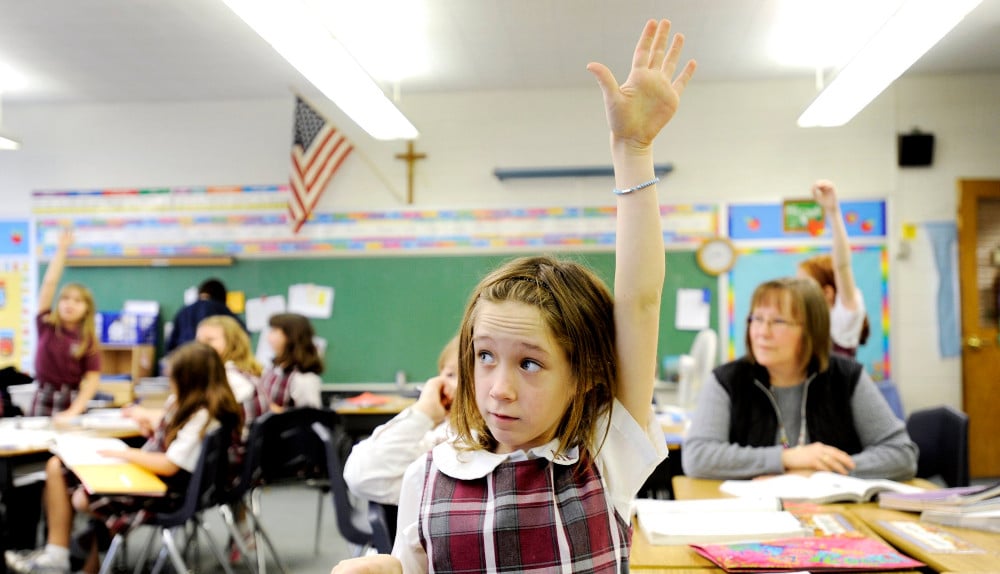This fall, Pew Research Center released a demographic study that predicts that by 2070 Christians will be a minority in the United States. That demographic change will happen, according to Pew’s models, not because of growth of non-Christian religions but because of a predicted acceleration of disaffiliation among Christians. Currently, Christians make up about 64% of the U.S. population. However, if trends continue or accelerate, that number could fall as low as 35% in the next 40 years.
What are we to do about this alarming trend? One answer is to redouble our efforts in Catholic education. As this Editorial Board has argued, the growth in enrollment in Catholic schools is a significant opportunity for evangelization. As we said this fall, “It allows dioceses the chance to creatively and effectively make use of additional resources in a way that prioritizes the catechesis and evangelization of a generation that the Church desperately needs, and at the same time strengthens the Catholic identity of indispensable religious institutions.” As we celebrate National Catholic Schools Week (Jan. 29-Feb. 4), the unique identity of Catholic schools is worth exploring.
To protect and enrich their Catholic identity, Catholic schools will have to take clear stances on cultural trends that will prove difficult for the culture at large to accept. Teaching the truth of human sexuality is increasingly fraught, as educators navigate treacherous waters, leading students and their families in Gospel charity to the Truth. These same schools will be tempted to compromise that integrity in order to secure school finances, resolve tensions in the local community or even to participate in particular athletic leagues.
But clear Catholic identity is not chiefly about contrast with the age. We are not defined by what we stand against. And the rich tradition of Catholic education is about so much more than resisting the sexual revolution or any number of woke ideologies. The late Pope Benedict XVI offered a vision during his 2008 visit to the United States for strengthening the Catholic identity at the heart of Catholic schools. And that vision is more relevant today than ever before.
To strengthen the identity of Catholic schools, Pope Benedict calls every Catholic student and educator to ask the fundamental question: “To whom do I belong?” The strength of our institutions, according to Pope Benedict, depends not on numbers but on our conviction. Our belief in Jesus — made tangible in our schools by our commitment to the practice of the sacraments, to moral living, to acts of charity, to respect for creation and more — shines the light of the Gospel in our hallways.
Is the name of Jesus spoken often and with love in our corridors? Are we certain that other philosophies or priorities have not superseded him? These are not questions that can be asked once and for all. They are part of the examination of conscience that is the daily life of a believer. But we must not fail to ask them of our schools as well as of our own selves.
Because we are believers in Jesus, then, and know him personally, Truth is not abstract or distant. Truth dwells in our schools as a friend. Christ, the great truth of our life, the one who enlightens every mind, reveals to us the truth of every human affair. Religion can no less be consigned to one class period in a Catholic school than the wind could be contained in one corner of the ocean. Life with Christ influences every subject, every activity, every sport, every space that is part of Catholic education.
This truth gives us confidence. Catholic educators, imbued and bolstered by him who is the truth, have the freedom to be supremely creative. We are not protecting our institutions so that they serve the needs of a bygone age. Far from it. Catholic schools can be the ultimate spaces for freedom and innovation because of the Truth who is the heart of the shared life of the school community.
Jesus Christ is the reason for every Catholic school. Every student and educator in a Catholic institution is invited to belong to him. Enlightened by him, Catholic teachers and students will have clarity of mind to face the most challenging and contentious questions of our day. And because of that confidence in him, a Catholic education is supremely liberating.
Our Sunday Visitor Editorial Board: Father Patrick Briscoe, Gretchen R. Crowe, Scott P. Richert, Scott Warden, York Young





